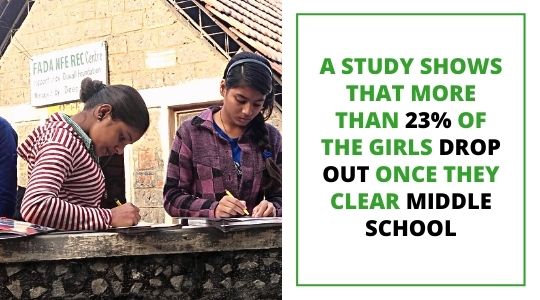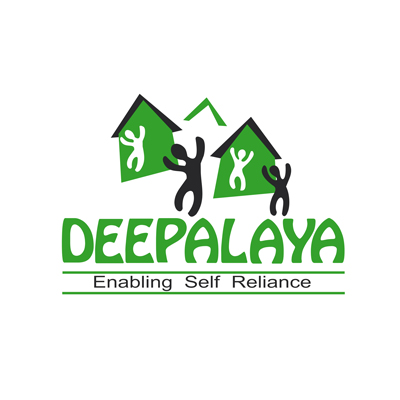Non Formal Education; the way forward!

Over the last more than four decades, Deepalaya has adopted non-formal education as one of the tools for mainstreaming out of school children and ensuring their rights are protected at the same time.
Even after 75 years of Indian Independence, we still have children, who are out of school. It is normal to see children dropping out of school once they cross 13 years of age. A study shows that more than 23 per cent of the girls drop out once they clear middle school. The tendency of girls dropping out is far more than boys. The reasons are wide-ranging; social, economic and religious. This situation needs to be addressed immediately. The pandemic has only worsened this crisis.
Over the last more than four decades, Deepalaya has adopted non-formal education as one of the tools for mainstreaming out of school children and ensuring their rights are protected at the same time. The technique requires the instructors to use a bridge-course curriculum while keeping the parents informed and engaged continuously. Once the child starts progressing, he/she dropping out of the system becomes a rare possibility. The concept has helped in developing the aspirations of both the child and the parents. Once the child attains age-appropriate learning outcomes, he/she is mainstreamed to government schools. It certainly offers a solution and can play a pivotal role in reducing out of school children.
Ahmed and Coombs defined Non-formal education as ‘Any organized, systematic, educational activity carried outside the framework of the formal system to provide selected types of learning to particular sub-group in the population, adults, as well as children.’ Deepalaya provides non-formal education to underprivileged children who are unable to attend schools due to economic and social constraints.

The children enrolled in non-formal education centers undergo extensive training on life skill education, behavioral change communication sessions, workshops on relevant topics like menstrual health, hygiene, mental health, socio-emotional learning, library activities along with academic learning. In the remedial education classes, children who are enrolled in the government schools are helped in following their school curriculum.
Even after a plethora of development projects, schemes, programs and legal mechanisms, India is still grappling to tackle this issue, which stems out of social evils, discrimination, superstitions, regressive thoughts and fundamentalism. People still believe in discouraging girls' education. Their reasons are bizarre and unacceptable. Many of these girls are treated as a liability, "burden" to be more precise, and are married off as quickly as they can. In a patriarchal society like ours, fathers do have a great say in the upbringing of a girl child.

Of late, we witnessed the impact of one of our projects aptly named "Father and Daughter Alliance" (FADA). Even though the project got closed way back in 2018, the girls, who were part of the project, continued their education, even during the absence of the intervention. The project not only educated girls but also involved fathers effectively. Being the bread-winners and the sole decision makers, the project began with extensive counseling sessions. Once the girls were enrolled in the project, every month we had a father's meeting instead of parent-teacher meetings. The project looked closely at the performance of the girls and kept the fathers informed about their achievements. Fathers, who never interacted with their daughters, started taking pride after seeing the sea-change in their daughters. Not only, these fathers became the brand ambassadors of FADA in the community and started raising voices against men, who wanted their daughters to be married off or force them to look at the household chores instead of going to schools.

Over a period of eight years, the project not only impacted the lives of 300 girls enrolled in the project but also brought an attitudinal change in the people living in and around Sanjay Colony. Some of these men, who worked as artisans in the nearby textile industries and so on, took art classes for the girls. They even cooked food for the girls, even if they were no culinary expert. The gesture itself spoke volumes as these little girls felt supported by their fathers. Unfortunately, due to lack of funds, we had to close the project.

Five of these girls from the FADA project, Sanjana, Laali, Archana, Pinky and Kajal who joined Deepalaya in 2010 under the FADA project passed their Class X Board Examinations this year. They were few of the brightest students we had under this project. Despite the fact FADA Project became inactive in 2018, our teacher Ms. Pooja continued to mentor them. When they got their 10th Board Results, they immediately shared the news with Ms. Pooja. It was a dream come true for all of us at Deepalaya. It is more important to mention that these girls will continue their education. But for Deepalaya's FADA project, this would have been a distant dream for these girls. Ten students from our Deepalaya learning center, Sanjay Colony have also passed with flying colors.
Amar Singh, one of the proud fathers of Muskan and Varsha, feels so proud of the achievements of her daughters. While Varsha cleared her class 10th with good marks, his elder daughter Muskan took on dancing as a profession after clearing her higher secondary. "Hum jaise majdoor logo ke liye hawayi jahaz mein uraan bharna, ek sapna hi hota hai.. Meri beti Muskan ki waja se hamara yeh sapna poora hua, says Amar Singh. (It is impossible for a migrant labourer like me to even dream of flying in a plane. My daughter Muskan fulfilled this dream), Muskan has now flying from one state to another for participating in various dance competitions. At times, Amar Singh too accompanies her.

This is the story of only one girl. There are many such stories. They remind us that given a chance, these children will spread their wings and soar high. We need more Projects like FADA to educate these children and guide them on their journey towards self-reliance. Non-formal education coupled with remedial education is the way forward to educate underprivileged children in the post-covid world. The technique has not only helped the children in continuing their education but has also saved them from being forced to labour or early marriage.

Leave a Reply